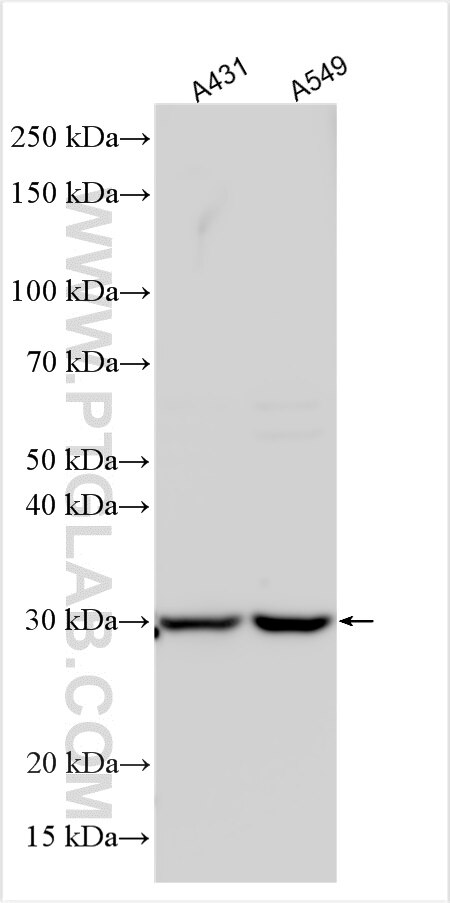Tested Applications
| Positive WB detected in | A431 cells, A431 cell, A549 cell |
Recommended dilution
| Application | Dilution |
|---|---|
| Western Blot (WB) | WB : 1:1000-1:4000 |
| It is recommended that this reagent should be titrated in each testing system to obtain optimal results. | |
| Sample-dependent, Check data in validation data gallery. | |
Product Information
31840-1-AP targets TATDN1 in WB, ELISA applications and shows reactivity with human samples.
| Tested Reactivity | human |
| Host / Isotype | Rabbit / IgG |
| Class | Polyclonal |
| Type | Antibody |
| Immunogen | TATDN1 fusion protein Ag36040 Predict reactive species |
| Full Name | TatD DNase domain containing 1 |
| Observed Molecular Weight | 30 kDa |
| GenBank Accession Number | BC064964 |
| Gene Symbol | TATDN1 |
| Gene ID (NCBI) | 83940 |
| RRID | AB_3670124 |
| Conjugate | Unconjugated |
| Form | Liquid |
| Purification Method | Antigen affinity Purification |
| UNIPROT ID | Q6P1N9 |
| Storage Buffer | PBS with 0.02% sodium azide and 50% glycerol, pH 7.3. |
| Storage Conditions | Store at -20°C. Stable for one year after shipment. Aliquoting is unnecessary for -20oC storage. 20ul sizes contain 0.1% BSA. |
Background Information
Homo sapiens TatD DNase domain containing 1 (TATDN1), a member of the TATD family, is a highly conserved nuclease in both prokaryotes and eukaryotes with depurine/apyrimidine (AP) endonuclease activity, which plays an extremely important role in the genesis and prognosis of malignant tumors such as NSCLC and breast cancer, and is a potential therapeutic target for NSCLC patients who have failed to undergo cisplatin therapy (DDP) in vivo.
Protocols
| Product Specific Protocols | |
|---|---|
| WB protocol for TATDN1 antibody 31840-1-AP | Download protocol |
| Standard Protocols | |
|---|---|
| Click here to view our Standard Protocols |



